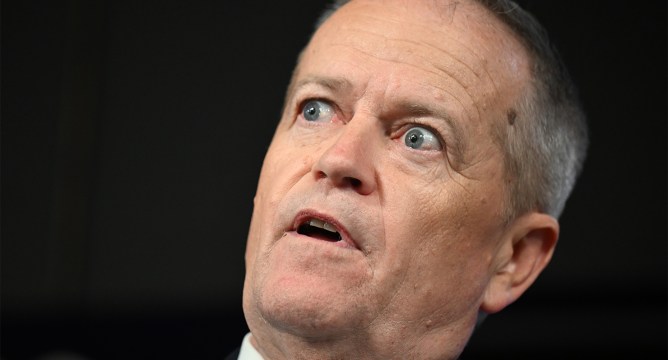The Albanese government’s decision not to proceed with a total ban on gambling advertising, as unanimously recommended by a committee chaired by the late Peta Murphy, is enough to test anyone’s faith in the system. Anti-gambling advocates, crossbenchers, journalists, and former PMs are among those frustrated that a popular, common sense move has been derailed by vested interests, with not even Murphy’s passing enough to compel Labor to grow a spine.
Curtin MP Kate Chaney has been closer to this process than most, as the sole independent on the Standing Committee on Social Policy and Legal Affairs. But despite the committee having been “very positive and very constructive”, Chaney, who won her Perth seat off the Liberals in 2022’s teal wave, wasn’t surprised when reports emerged that the government was leaning towards a partial ban — something the committee heard would not work.
“Disappointed but not surprised,” she tells me, adding that she could see from information obtained via freedom of information requests that the communications minister had been meeting with groups “financially invested in gambling harm”. The committee has had little interaction with the minister; few other members have spoken up for the recommendation they endorsed just over a year ago.
“Watching the 14 months since then, it has been a good reminder to me about the real problems with the two-party system,” says Chaney, pointing to the influence of gambling companies, broadcasters and sports codes. “Major parties have a different set of decision factors rather than what’s best for the community … There’s an important role for the crossbench in holding parties to account.”
It’s a depressing turn of events. But Chaney remains optimistic, suggesting Labor may still respond to the community backlash (reports today suggest the government is delaying the announcement yet again). “Hopefully we get some improvement,” she says, adding that it is worth celebrating whatever “wins” they can get.
Some might suggest that the title of Murphy’s report — “You win some, you lose more” — neatly sums up the past two years for the teal MPs, who have put forward countless amendments and private member’s bills with little to no chance of passing. And yet Chaney hasn’t been swayed from her belief that independents can make change, with or without a balance of power (though with would obviously be preferable).
“Democracy is slow and messy,” she says when I question how few wins they have had. “I think nudging, finding the points that matter and nudging them, does have an impact, even if it’s not immediate.” She takes heart from Indi MP Helen Haines’ push for a federal anti-corruption commission. It took years before it became an election issue, but in the end we got one — albeit not as powerful as many would’ve liked.
“People don’t seem to understand — I didn’t before I was in the job — that if you introduce a private members bill, it doesn’t get debated, it doesn’t become law. What’s the actual point of it? It changes the conversation. That’s the point of it.”
It’s little wonder Chaney’s team tease her for being a “democracy nerd.” Between this and her focus on electoral reform (Chaney also sits on the Standing Committee on Electoral Matters, and has put forward two private member’s bills, the most recent being her Fair and Transparent Elections Bill), the former Anglicare WA strategy director likes thinking “at a systems level” — something she attributes to her 10 years on the board of non-profit Next25.
“We’ve built these two machines that are focused on winning elections,” she says. “Where’s the machine that focuses on the future of the country? I still think that the Parliament can play that role if it can continue to evolve, rather than the Parliament being a waiting room for the executive where you sit around and wait til it’s your turn, and chuck some rocks in the meantime.”
Chaney will be running again at the next election and insists she isn’t focusing her decisions on winning votes. Some may dispute that. Chaney recently changed her mind to oppose Labor’s live sheep export ban, a hot-button issue in WA, for which the Kerry Stokes-owned West Australian labelled her a “DAG” (Chaney took it in good spirits).
Chaney put out a video explaining that she’d switched sides based on feedback from the electorate. “It’s hard to change your mind, but as a community independent, I committed to listening to my community, and that’s what I’ve done,” she told viewers, adding that such a thing isn’t possible for major party MPs.
I put it to Chaney that there is a strong parallel between listening to your electorate and winning votes. She agrees, with the caveat that she has to do more than just take a poll and vote accordingly.
“I’ve also been elected to use my judgment and to look into the issues,” says Chaney, adding that she weighs up a range of community opinions, as well as listening to arguments from experts. “There’s no formula as to how you weigh up those different things, but it is a very explicit process that we go through.”
Chaney is still hopeful that the Labor leadership could listen to the feedback and evidence, and change their mind on the gambling ad ban.
“The government could really do with a win at the moment, and a show of strength, and this could be a legacy,” she says. “We could look back and say ‘remember when the Albanese government made gambling ads history like we did with tobacco?’ I hope that the government finds some strength and actually gets on with it.”
Could Labor still surprise with a total gambling ad ban? Let us know your thoughts by writing to [email protected]. Please include your full name to be considered for publication. We reserve the right to edit for length and clarity.
